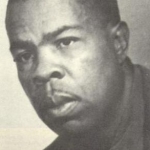Rudolph Reed was oaken.
His wife was oaken too.
And his two good girls and his good little man
Oakened as they grew.
“I am not hungry for berries.
I am not hungry for bread.
But hungry hungry for a house
Where at night a man in bed
”May never hear the plaster
Stir as if in pain.
May never hear the roaches
Falling like fat rain.
“Where never wife and children need
Go blinking through the gloom.
Where every room of many rooms
Will be full of room.
”Oh my home may have its east or west
Or north or south behind it.
All I know is I shall know it,
And fight for it when I find it.“
It was in a street of bitter white
That he made his application.
For Rudolph Reed was oakener
Than others in the nation.
The agent’s steep and steady stare
Corroded to a grin.
Why, you black old, tough old hell of a man,
Move your family in!
Nary a grin grinned Rudolph Reed,
Nary a curse cursed he,
And his dark little children three.
A neighbor would look, with a yawning eye
That squeezed into a slit.
But the Rudolph Reeds and the children three
Were too joyous to notice it.
For were they not firm in a home of their own
With windows everywhere
And a beautiful banistered stair
And a front yard for flowers and a back yard for grass?
The first night, a rock, big as two fists.
The second, a rock big as three.
But nary a curse cursed Rudolph Reed.
(Though oaken as man could be.)
The third night, a silvery ring of glass.
Patience ached to endure.
But he looked, and lo! small Mabel’s blood
Was staining her gaze so pure.
Then up did rise our Rudolph Reed
And pressed the hand of his wife,
And went to the door with a thirty-four
And a beastly butcher knife.
He ran like a mad thing into the night.
And the words in his mouth were stinking.
By the time he had hurt his first white man
He was no longer thinking.
By the time he had hurt his fourth white man
Rudolph Reed was dead.
His neighbors gathered and kicked his corpse.
”Nigger—“ his neighbors said.
Small Mabel whimpered all night long,
For calling herself the cause.
Her oak-eyed mother did no thing
But change the bloody gauze.
















Comment form: